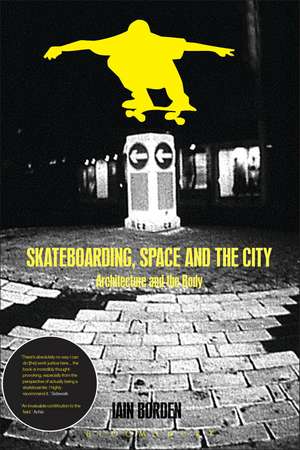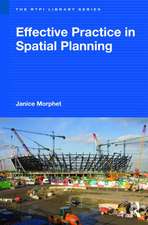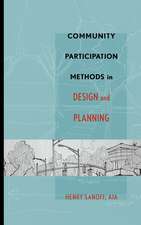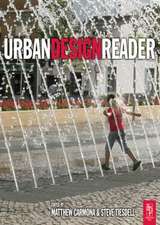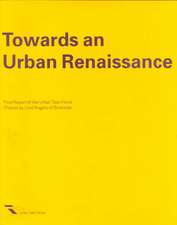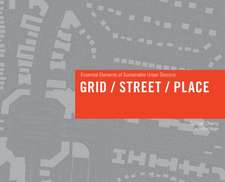Skateboarding, Space and the City: Architecture and the Body
Autor Professor Iain Bordenen Limba Engleză Paperback – 31 mar 2003
| Toate formatele și edițiile | Preț | Express |
|---|---|---|
| Paperback (1) | 234.82 lei 6-8 săpt. | |
| Bloomsbury Publishing – 31 mar 2003 | 234.82 lei 6-8 săpt. | |
| Hardback (1) | 777.39 lei 6-8 săpt. | |
| Bloomsbury Publishing – 31 mar 2001 | 777.39 lei 6-8 săpt. |
Preț: 234.82 lei
Preț vechi: 267.15 lei
-12% Nou
Puncte Express: 352
Preț estimativ în valută:
44.94€ • 46.74$ • 37.10£
44.94€ • 46.74$ • 37.10£
Carte tipărită la comandă
Livrare economică 14-28 aprilie
Preluare comenzi: 021 569.72.76
Specificații
ISBN-13: 9781859734933
ISBN-10: 1859734936
Pagini: 336
Ilustrații: 75 b&w illustrations, bibliography, index
Dimensiuni: 156 x 234 x 16 mm
Greutate: 0.54 kg
Ediția:Revised.
Editura: Bloomsbury Publishing
Colecția Berg Publishers
Locul publicării:London, United Kingdom
ISBN-10: 1859734936
Pagini: 336
Ilustrații: 75 b&w illustrations, bibliography, index
Dimensiuni: 156 x 234 x 16 mm
Greutate: 0.54 kg
Ediția:Revised.
Editura: Bloomsbury Publishing
Colecția Berg Publishers
Locul publicării:London, United Kingdom
Caracteristici
Also available in hardback, 9781859734889 £55.00 (April, 2001)
Notă biografică
Iain Borden Director of Architectural History and Theory and Reader in Architecture and Urban Culture at the Bartlett,University College London
Recenzii
Those few of us in the academy engaged in writing about the sociospatial relations of skating delight in the polished arguments that Borden presents over nine logically structured, pertinent and stylishly illustrated chapters.
The book is excellently researched and draws upon an exhaustive aumount of secondary data on skateboarding. A highly original and extremely well written text that discusses the historical and cultural meaning of skateboarding through an engagin reading of the work of Lefebvre and others.
Borden describes the emergence of not so much a sport as a way of life ... Its relation to architecture is kept beautifully clear . . . a good read.
Skateboarders help us to think about buildings and their use. Borden argues that they draw our attention to the city as the site of perpetual change.
The first academic study of skateboarding.
There's absolutely no way I can do [the] work justice here the book is incredibly thought-provoking, especially from the perspective of actually being a skateboarder. I highly recommend it.
A fine book that I recommend to any skateboarder who can read at a college level.
Borden owes as much to 30 years' of personal passion and experience as he does to any architectural or social theory.
[The book] delineates an architectural history, as yet largely unwritten, which focuses upon 'processes, possibilities, reproduction, performance and use.' Skateboarding, Space and the City reads the city through body and board - not merely through books. At a moment when architecture history/theory consists primarily of regurgitated texts intelligently referenced, inclusion of 'fieldwork' makes Borden's book an invaluable contribution to the field.
Serves as a fine model for future environment-behaviour research. It provides a fascinating, open-ended, and ultimately optimistic vision of urban life, for designers, researchers, and citizens.
[This book shows] a clearly detailed knowledge of both his chosen theoretical approach and the magazines of the skating community.
This is an amazing book and a real surprise. A first. Pick it up and you'll learn something interesting about the cities you skate in; you might even learn something about skating itself.
Even if you don't like books, this book is wicked. This book is about you. It is not written by another 'band wagon jumper oner'. Iain Borden is a rare breed. I'd like to meet this man and shake him by the hand. He is on our side.
The author may be one of very few people to be interested in both skateboarding and architectural theory, but that shouldn't deter readers who aren't familiar with both. Borden's book is clearly written and will guide you through with little confusion . . . Skateboarding, this marginalised, counter-culture sport, makes a perfect partner for this cutting-edge reinterpretation - and the liveliness of this book is not just in its topic, but also the many pictures and straight-talking quotes taken from actual skaters about how they think about skateboarding. Even for a non-skater, its treatment of the development of skateboarding is a fascinating slice of cultural history.
The book is excellently researched and draws upon an exhaustive aumount of secondary data on skateboarding. A highly original and extremely well written text that discusses the historical and cultural meaning of skateboarding through an engagin reading of the work of Lefebvre and others.
Borden describes the emergence of not so much a sport as a way of life ... Its relation to architecture is kept beautifully clear . . . a good read.
Skateboarders help us to think about buildings and their use. Borden argues that they draw our attention to the city as the site of perpetual change.
The first academic study of skateboarding.
There's absolutely no way I can do [the] work justice here the book is incredibly thought-provoking, especially from the perspective of actually being a skateboarder. I highly recommend it.
A fine book that I recommend to any skateboarder who can read at a college level.
Borden owes as much to 30 years' of personal passion and experience as he does to any architectural or social theory.
[The book] delineates an architectural history, as yet largely unwritten, which focuses upon 'processes, possibilities, reproduction, performance and use.' Skateboarding, Space and the City reads the city through body and board - not merely through books. At a moment when architecture history/theory consists primarily of regurgitated texts intelligently referenced, inclusion of 'fieldwork' makes Borden's book an invaluable contribution to the field.
Serves as a fine model for future environment-behaviour research. It provides a fascinating, open-ended, and ultimately optimistic vision of urban life, for designers, researchers, and citizens.
[This book shows] a clearly detailed knowledge of both his chosen theoretical approach and the magazines of the skating community.
This is an amazing book and a real surprise. A first. Pick it up and you'll learn something interesting about the cities you skate in; you might even learn something about skating itself.
Even if you don't like books, this book is wicked. This book is about you. It is not written by another 'band wagon jumper oner'. Iain Borden is a rare breed. I'd like to meet this man and shake him by the hand. He is on our side.
The author may be one of very few people to be interested in both skateboarding and architectural theory, but that shouldn't deter readers who aren't familiar with both. Borden's book is clearly written and will guide you through with little confusion . . . Skateboarding, this marginalised, counter-culture sport, makes a perfect partner for this cutting-edge reinterpretation - and the liveliness of this book is not just in its topic, but also the many pictures and straight-talking quotes taken from actual skaters about how they think about skateboarding. Even for a non-skater, its treatment of the development of skateboarding is a fascinating slice of cultural history.
